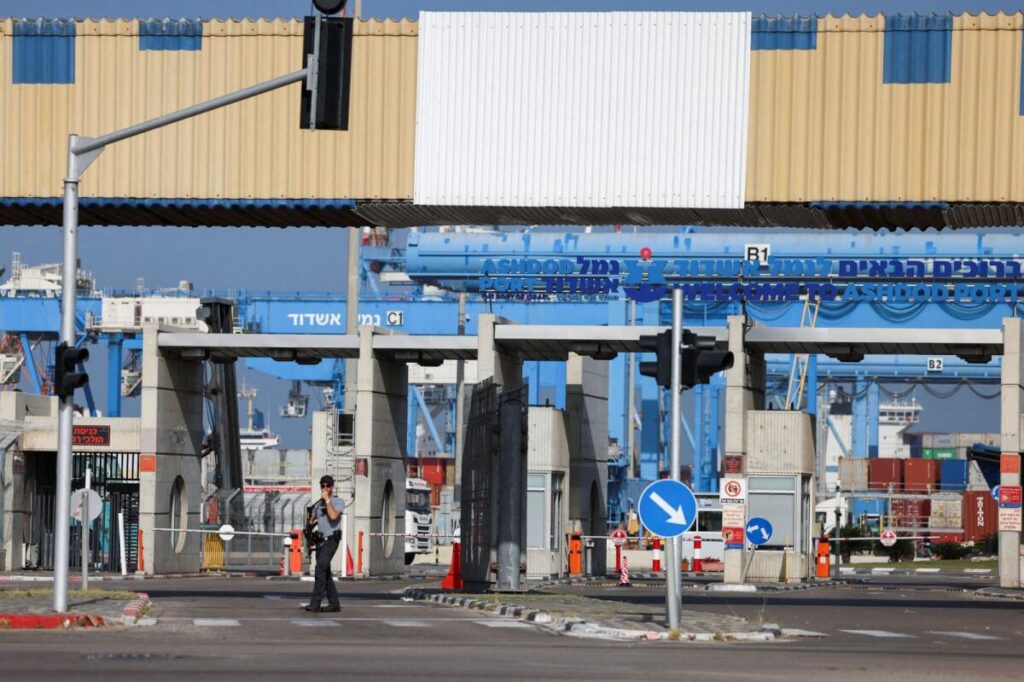
Israel has come under mounting international pressure over the toll inflicted by its six-month war on Hamas
Israel made an announcement on Friday stating that it would permit temporary aid deliveries into famine-threatened northern Gaza, shortly after the United States cautioned of a significant shift in its policy concerning the Gaza war.
During a tense, 30-minute phone call on Thursday, US President Joe Biden informed Prime Minister Benjamin Netanyahu that US policy on Israel was contingent upon the safeguarding of civilians and aid workers in Gaza, marking the first indication of potential conditions to Washington’s military support.
Mere hours later, in the dead of night in Jerusalem, Israel declared its intention to open additional aid routes into blockaded Gaza.
Israel’s war cabinet approved temporary aid deliveries through the Ashdod Port and the Erez land crossing, along with increased deliveries from neighboring Jordan at the Kerem Shalom crossing, as reported by Netanyahu’s office.

The White House promptly commended these actions — labeling them as per the president’s request — emphasizing the necessity for their complete and rapid execution.
Israel has faced escalating international pressure due to the toll inflicted by its six-month war on Hamas, eliciting increasingly stern rebukes from its primary supporter, Washington.
Since the commencement of the war on October 7, Israel’s retaliatory actions have resulted in the deaths of at least 33,037 individuals and have prompted warnings of dire hunger.
According to Oxfam, Palestinians in northern Gaza have been surviving on an average of only 245 calories per day — less than the content of a single can of beans — since January.
Charitable organizations have repeatedly accused Israel of obstructing aid and targeting convoys, with the perilous nature of attempting to alleviate famine underscored by an Israeli airstrike that claimed the lives of seven humanitarian workers distributing food in Gaza.
Biden conveyed to Netanyahu during their call that the strikes on humanitarian workers and the overall humanitarian situation were unacceptable, as per a White House statement.
Biden also made it clear that US policy regarding Gaza would be determined by evaluating Israel’s immediate efforts to ameliorate the humanitarian crisis.
Longstanding Israel supporter Biden is encountering escalating pressure in an election year regarding his response to the Gaza conflict, with allies urging him to condition the billions of dollars in military aid sent by Washington on Netanyahu heeding calls for restraint.
US National Security Council spokesman John Kirby acknowledged Biden’s mounting frustration with Netanyahu, reiterating, however, that US support for Israel’s security remained steadfast.
Netanyahu has pledged to dismantle Hamas, including in Gaza’s southern city of Rafah, while committing to relocating over one million civilians from the city out of harm’s way.
Pentagon chief Lloyd Austin highlighted that the deadly strike on the World Central Kitchen staff had amplified concerns about a potential Israeli military operation in Rafah, specifically stressing the imperative to ensure the evacuation of Palestinian civilians and the unimpeded flow of humanitarian aid.
During a conversation with his Israeli counterpart Yoav Gallant, Austin also addressed the threat posed by Iran and its proxy activities, as per the Israeli army.
Israel was held accountable for an airstrike on Monday on the Iranian consulate in Damascus that claimed the lives of seven Revolutionary Guards, including two generals.
Iran’s supreme leader Ayatollah Ali Khamenei vowed through a social media post in Hebrew that, with divine assistance, “we will make the Zionists repent for their crime of aggression against the Iranian consulate in Damascus.”
Following a situational assessment, the Israeli military decided to augment manpower and conscript reserve soldiers.
It was further disclosed that leave for all combat units would be temporarily suspended.